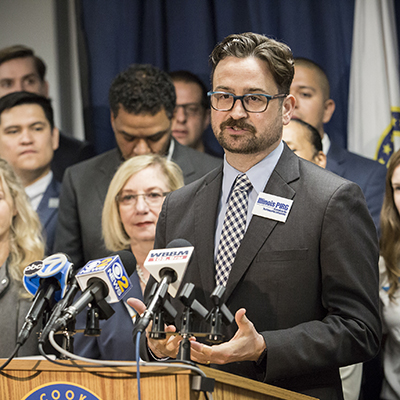
#EEDay2018 – States Can Lead
The cheapest, cleanest energy is the energy we don’t use in the first place. Whether you care about improving air quality, fending off the worst impacts of global warming, or simply saving money, energy efficiency and conservation are critical.
The cheapest, cleanest energy is the energy we don’t use in the first place.
Whether you care about improving air quality, fending off the worst impacts of global warming, or simply saving money, energy efficiency and conservation are critical.
And there is so much more we can do. America can reduce its energy consumption 40 to 60 percent by mid-century by eliminating waste and adopting better technologies.
Today is Energy Efficiency Day. Along with our partners at Environment America, we’re celebrating #EEDay2018 by releasing “A Citizen’s Guide to Reducing Energy Waste.” As this consumer guide and interactive website demonstrate, individual action goes a long way.
But we won’t reduce energy waste on the scale that we need to by each going it alone. We need to take larger-scale actions to protect our environment and our health.
We need governments and other major institutions to advance public policy and technological solutions. If states want to take a major step, they can reduce energy waste in our homes and businesses by raising efficiency standards for appliances.
When states lead, the nation follows. California, New York and Florida refrigerator standards were the basis of — and catalyst for — the 1987 national refrigerator standards. Similarly, in 2009, President Barack Obama announced new emissions standards for cars that would protect the environment and public health and save more than a billion barrels of oil, following the example of 13 states around the country.
If enough states take similar actions, they can create de facto national standards. With appliance standards, to meet the requirements of several states, it becomes more efficient for manufacturers to update their entire product line, which then gets sold even in states that have not adopted higher standards.
Last year, the Appliance Standards Awareness Project (ASAP) released a report evaluating the impacts of strengthened efficiency standards for 21 recommended appliances and products. They found that, if adopted, these updated standards would:
-
save enough energy to power all American homes and businesses for two months
-
reduce carbon emissions by 320 million metric tons
-
save consumers and businesses $113 billion.
For 19 of the 21 products ASAP recommends, some efficiency standards already exist. For about half of the product classes, at least fifty percent of the models currently on the market already meet the higher recommended standards. Because states can base their standards on existing programs (such as ENERGYSTAR or WaterSense), state adoption of higher standards is both easy and low-cost.
Appliance standards are not only a highly effective, low-cost way for states to improve energy efficiency — they’re also popular. According to new polling data released today by the Consumer Federation of America, 71 percent of Americans “support the idea that the government should set and update energy efficiency standards for appliances.”
The question is not if, but when, states start adopting higher appliance efficiency standards, and which states will be leaders. I’ll be working to convince Illinois decision makers to lead, not follow, and I’ll be watching with interest what other states do.
Authors
Abe Scarr
State Director, Illinois PIRG; Energy and Utilities Program Director, PIRG
Abe Scarr is the director of Illinois PIRG and is the PIRG Energy and Utilities Program Director. He is a lead advocate in the Illinois Capitol and in the media for stronger consumer protections, utility accountability, and good government. In 2017, Abe led a coalition to pass legislation to implement automatic voter registration in Illinois, winning unanimous support in the Illinois General Assembly for the bill. He has co-authored multiple in-depth reports on Illinois utility policy and leads coalition campaigns to reform the Peoples Gas pipe replacement program. As PIRG's Energy and Utilities Program Director, Abe supports PIRG energy and utility campaigns across the country and leads the national Gas Stoves coalition. He also serves as a board member for the Consumer Federation of America. Abe lives in Chicago, where he enjoys biking, cooking and tending his garden.